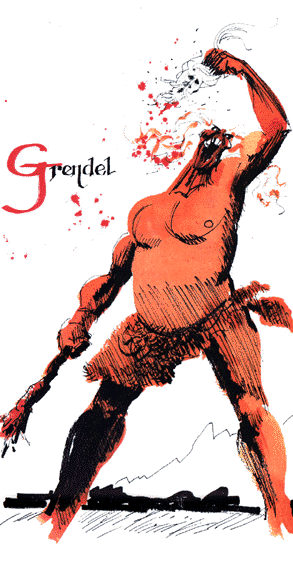PART ONE: GRENDEL
Grendel Attacks
One night, after a beer party,
the Danes settled in the hall
for sleep; they knew no sorrows.
The evil creature, grim and hungry,
grabbed thirty warriors
and went home laughing.
At dawn, when the Danes learned
of Grendel's strength,
there was great weeping.
The old king sat sadly,
crying for his men. Bloody
footprints were found.
That was bad enough,
but the following night
Grendel killed more--
blinded by sin,
he felt no remorse.
(You can bet the survivors
started sleeping elsewhere.)
So Grendel ruled,
fighting right,
one against many,
and the greatest hall
in all the earth
stood empty at night.
Twelve years this went on,
Hrothgar suffering
the greatest of sorrows.
Poets sang sad songs
throughout the world,
how Grendel tormented Hrothgar;
how no warrior,
no matter how brave,
could kill Grendel.
How Grendel wasn't
about to stop,
or pay damages.
Grendel kept ambushing from his lair,
the moors which lay in perpetual darkness.
Then, the cruelest of all injuries,
he moved into the hall--
stayed there every night
(though God would never allow
such an evil thing
to actually touch the throne).
Hrothgar was broken;
council after council proposed
what to do against the attacks.
They even went to heathen temples,
worshipped idols, and called
to the Devil for help.
The Danes forgot God.
(Woe be to those who go
to the fire's embrace,
even in great distress--
There is no consolation there.)
No counselor, no warrior
could destroy the evil.
They wept and seethed.
Beowulf Hears of Grendel
But a warrior of Hygelac's
heard of Grendel's doings;
he was the strongest of men
alive in that day,
mighty and noble.
That man called for a ship,
said he would cross the ocean
and help the king who needed help.
Wise men urged him
to that adventure
though he was dear to them.
They examined omens
and whetted him on.
So the good Geat chose
the bravest warriors,
fourteen of them,
and that crafty sailor
led them to the land's brim,
to the ship.
They readied the ship
on the waves under the cliffs
and the warriors stood at the prow
as the water wound against the sand.
The warriors bore
into the ship's bosom
bright weapons,
fitted armor.
The men shoved
the well-braced ship
out on the journey
they'd dreamed of.
The foamy-necked ship
went out like a bird
so that the next day
its curved prow
had gone so far
that the seafarers saw land,
shining shore cliffs
and steep mountains.
Their journey was already over
and the Geat warriors
pulled their ship to the shore
and stood on land
in their rattling shirts,
their war-clothes. They
thanked God for an easy trip.
From his wall the sea-guard of the Danes,
protector of the cliffs,
saw bright shields
and ready war dress
coming over the gang plank
and he wondered
who those men were.
Hrothgar's warrior rode
to shore on his horse.
Shaking a mighty spear, he spoke:
"Who are you, in armor,
who come over the sea-road
in that steep keel?
Listen: I guard here
so that no forces
hostile to the Danes
may raid. Never has
one so openly brought
a ship's army, warriors,
without the permission of my kinsmen.
And never have I seen
a greater man on earth,
any man in armor,
than is one among you.
Unless I'm wrong,
that is no hall-man,
just wearing armor--
his stature is peerless.
I wish to know your lineage now
so I know you are not spies
going into the land of the Danes.
You far-dwellers, seafarers,
hear my simple thought:
you had best hurry to tell me
where you come from."
Beowulf, leader of the host
unlatched his word-hoard:
"As to kin, we are of the Geat nation,
Hygelac's hearth-companions.
My father was a leader well known
among the people: Edgtheow.
He stayed many winters
before he went away,
aged, from the court.
Every wise man readily remembers
him throughout the earth.
We have come with friendly hearts
to see your lord, Healfdene's son,
protector of the people.
Be good counsel to us:
we have come on a great errand
to the king of the Danes.
I think it foolish
to keep secrets. You know
if it is true what we have heard,
that a dark enemy in the nights
works violence and slaughter
on the Danes. . . . Perhaps
in kindness I may advise Hrothgar
how he, wise and famous,
may overcome this enemy--
if change will ever come,
relief from this evil--
and how this seething sorrow
might become cool.
Otherwise, he will suffer tribulation
as long as he lives in that high place,
the best of houses."
The protector of the coast,
still on his horse, spoke
(a wise shield warrior,
one who thinks well,
must judge two things:
works and words):
"I see that you are a band
friendly to the lord of the Danes.
Go forth, bearing arms and equipment.
I will guide you. Also,
I will order my men
to protect your ship,
that new-tarred boat on the sand,
until it bears you again
back over the water streams
with its curved wooden neck,
back to the land of the Geats--
if it be granted that you
endure the battle."
They left then the well-made ship
pulling at its rope.
On the gold-adorned helmets
figures of boars shone,
those guards over war-like minds.
The men excitedly marched until
they saw that ornamented hall,
the finest building on earth,
that glittered light over many lands,
where the mighty one waited.
The one brave in battle pointed
toward the resplendent hall;
the guard of the coast turned
his horse and said after them:
"It is time for me to go.
May the Father Omnipotent hold you
safe and sound in kindness!
I will go back to the sea
to hold against hostile bands."
End of episode two
